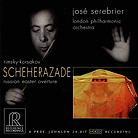March 2000
Despite this formidable competition, Josť Serebrier has thrown his hat into the ring with his recent recording with the LPO on Reference Recordings. A reading of the enclosed CD booklet shows that Serebrier has embarked on this undertaking with the seriousness of a John Elliot Gardener tackling a Beethoven score. Part of this approach shows how Serebrier is conscious of the performance history of this score, while trying to wring something both original and historically correct from this tried-and-true war-horse. Serebrier shows his determination to take a path less traveled with his willingness to delete some of the traditional notations to the LPO’s in-house score. Knowing that this score has passed through the hands of many a great conductor, one has to be impressed with Serebrier’s confidence in his approach to this piece of music. The end result is a Mercurial reading that exudes assurance and commitment. I’ve deemed this recording Mercurial due to Serebrier’s dramatic use of changes in tempo and dynamics. While the fast sections of this work are played at breakneck speeds, the adagios are performed at a nearly languorous pace. The sudden changes from pp to fff and back are startling in their adroitness. Despite these difficult transitions, the LPO never loses its firm grip on the music. Additionally, Serebrier and the LPO strut their stuff when it comes to fine details of the score. A great example is about halfway through the last movement where the piccolos play at a blindingly fast pizzicato series of runs without any blurring of the notes. Overall, this is a virtuoso performance of a technically demanding work. Through many listenings, I enjoyed this performance on both an intellectual and emotional level. Also on this disc is Rimsky-Korsakov’s Russian Easter Overture. Serebrier and the LPO’s account is up-tempo, which propels the music forward. As with Scheherazade, dynamics are used with great flair, which is necessary for this melodically challenged piece. This makes a nice desert that is worth listening to after the main course is done. As I mentioned, Serebrier’s recording of Scheherazade enters what is already a crowded field of contenders, and I’ll be the first to admit that I haven’t listened to them all. Many audiophiles will tell you that one to own is Fritz Reiner’s and the Chicago Symphony Orchestra’s performance, recorded during the height of RCA’s Living Stereo days. I’m embarrassed to admit that I’ve never purchased this recording in any of its various releases. Fortunately, I was able to borrow from a fellow audiophile the Chesky Records pressing of this revered performance (thanks Marc). Once I dropped the needle, it didn’t take long to understand what the hubbub was about. This recording of Scheherazade by the CSO shows an orchestra at a rarely attained level. It’s as if all the members of the CSO were of one mind and body for this session. No matter how fast Reiner pushes the tempo, this amazing coherence never falters. An addition, the interplay of the voices is so keenly brought out (thanks in a large part to the brilliance of the recording) that I quickly gained a greater understanding of the complex orchestration of this work. I could go on, but this album measures up to the praise heaped upon it. As an added bonus, my friend also lent me his shaded-dog pressing of Pierre Montex conducting Scheherazade with the London Symphony Orchestra [RCA LSC-2208]. Montex’s reading of this score is mannered, favoring steady rhythms and delicate tonal relationships. It’s not that the LSO doesn’t hit the fortes when needed. It’s just that they never really cut loose in the louder passages. This performance really does (as Serebrier notes) play up the dance aspects of this piece. While not as exciting as the Reiner and Serebrier interpretations, it is an interesting performance nonetheless. Like many great pieces of music, Scheherazade can be played a myriad of ways, all of them valid. The recordings I listened to for this review represent different approaches. If I had to pick one, I would be hard-pressed to decide between the Serebrier and the Reiner. Both combine top-rate performances with stunning sonics. The fact that I consider Serebrier’s and the LPO’s performance on equal footing with the other is high praise indeed. GO BACK TO: |
 Rimsky-Korsakov - Scheherazade
Rimsky-Korsakov - Scheherazade![[Reviewed on CD]](../format/regcd.gif) For
many of us who first started our love affair with large-scale classical music on our own,
Rimsky-Korsakov’s Scheherazade was one of our first flings. What has made this
piece such a beloved favorite is its blend of compelling melodies and orchestration.
Unlike many works that catch your ear initially but become tiresome after repeated
listenings, Scheherazade continues to entertain no matter how many I hear it.
Reflecting this piece’s popularity is the numerous times it has been recorded since
Thomas Edison got the ball rolling at the beginning of last century (that sounds weird,
doesn’t it?). If you don’t believe me, take a peek at how many Scheherazade
CDs are in your local music store’s Rimsky-Korsakov’s section. The venerable Penguin
Guide to Classical CDs lists no less than 18 recommended recordings.
For
many of us who first started our love affair with large-scale classical music on our own,
Rimsky-Korsakov’s Scheherazade was one of our first flings. What has made this
piece such a beloved favorite is its blend of compelling melodies and orchestration.
Unlike many works that catch your ear initially but become tiresome after repeated
listenings, Scheherazade continues to entertain no matter how many I hear it.
Reflecting this piece’s popularity is the numerous times it has been recorded since
Thomas Edison got the ball rolling at the beginning of last century (that sounds weird,
doesn’t it?). If you don’t believe me, take a peek at how many Scheherazade
CDs are in your local music store’s Rimsky-Korsakov’s section. The venerable Penguin
Guide to Classical CDs lists no less than 18 recommended recordings.